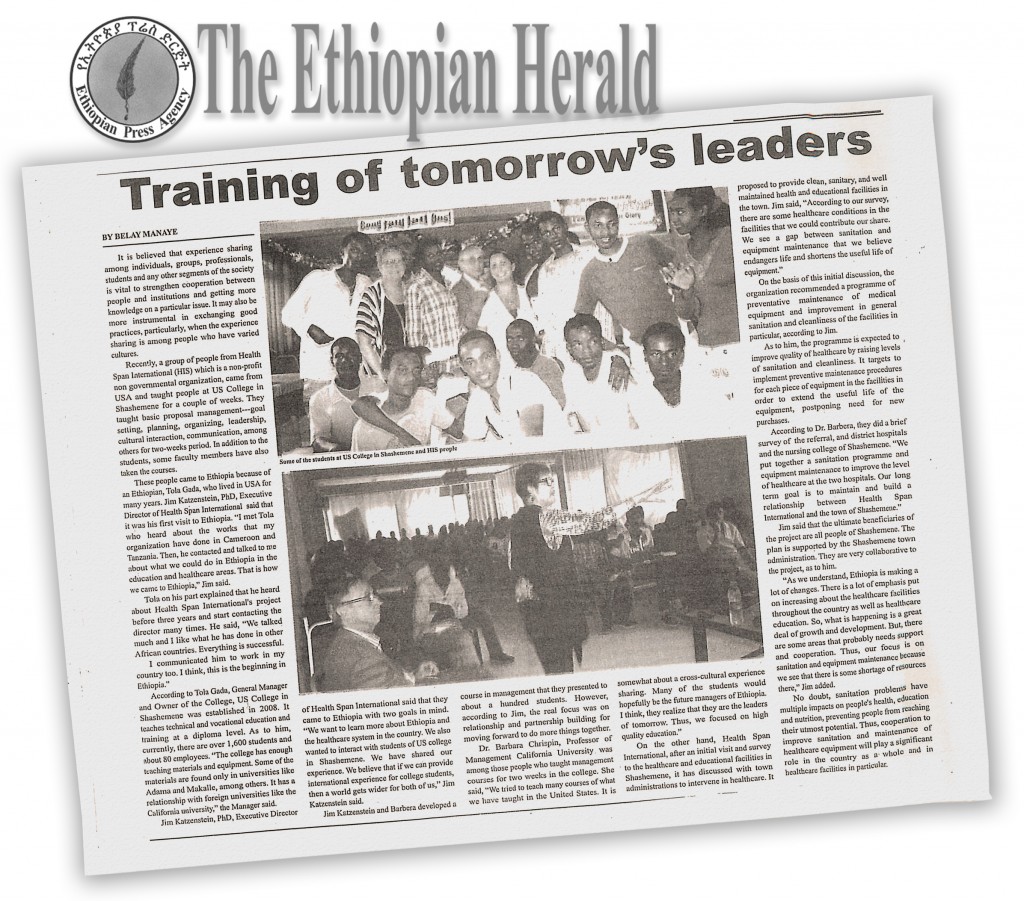In some respects, when companies from countries outside of Africa open businesses in Ethiopia, it’s an economic opportunity for the developing nation. In other respects, such imported enterprises introduce a host of challenges, something Jim Katzenstein, a full-time lecturer of management at California State University, Dominguez Hills, aims to remedy.

Foreign-owned businesses in Ethiopia often also become foreign-run businesses due to a dearth of trained Ethiopians who can step into managerial positions, according to Katzenstein. He points to an article, “African Management Initiative: catalyzing management development in Africa,” published by the African Management Initiative that reports a shortage of as many as four million skilled indigenous managers in Africa. Not only does this situation perpetuate the economic strain that a vast majority of Ethiopians experience, he notes, but it also creates a work environment that can lead to contentious relationships in the workforce as Ethiopians see much-needed jobs being taken up by foreigners.
To that end, Katzenstein has begun to work with the U.S. College in Shashemene, Ethiopia, assisting them in the establishment of an online management education development program for Ethiopian students modeled after the program offered by the College of Business and Public Policy (CBAPP) at CSU Dominguez Hills.
“[Ethiopians] are interested in an online program because, as in all developing countries, getting from point A to point B is difficult. And [U.S. College has] potential students in areas surrounding Shashemene, as far away as Addis Ababa, which is a five-and-half-hour drive,” Katzenstein remarked.
He has experience in such partnerships; since 2010, he, Barbara Chrispin, emeritus professor and former chair of management at CSU Dominguez Hills, and Cynthia Johnson, professor of nursing, chair of the Master of Nursing Program and graduate program coordinator, have been helping faculty at the Hubert Kairuki Memorial University (HKMU) in Dar Es Salaam, Tanzania, develop an online program in nursing to address nursing shortages in that country.
In a first step toward training faculty at U.S. College in this type of delivery mode, this fall two U.S. College faculty members logged in from Ethiopia and shadowed the online portion of Katzenstein’s hybrid business management course.

“They can see how it’s done, and they can interact with our students, and our students can interact with them,” said Katzenstein, who now serves on the CSU Dominguez Hills internationalization task force that University President Willie J. Hagan instituted in March.
The project went well, according to Katzenstein; the visiting faculty members were able to observe how management assignments were conducted online. Through Blackboard, Katzenstein provided the educators with access to textbook materials, PowerPoint lecture presentations, and discussion groups.
However, things hit a snag during the course’s discussion activity. Katzenstein explained that in developing countries often is the case that teaching and learning are one-way streets. In order to overcome that style of education and to break the ice, Katzenstein asked his students and the visiting faculty members to share details of their backgrounds with each other through the online discussion group component of the course.
“What I was hoping to do was to trigger a back-and-forth and that didn’t work out too well. They stopped. I suspect we had a cultural issue. Teachers there don’t do that. I think the students were okay, but when they didn’t get feedback, they just sort of stopped interacting.” Katzenstein added, “When a teacher [in Ethiopia] goes into a classroom, he doesn’t have technology. He is armed with some notes and a piece of chalk and he’s going to do a lecture.”
In a recent focus group, about a dozen students from Katzenstein’s class reviewed their experience and examined ways to overcome the divide, from scheduled discussion times to faculty-facilitated discussions. Katzenstein urged the group to consider ways to lead the online discussions to help put the Ethiopian faculty members at ease.
“Part of the problem was this was a medium that they had never used before. Ever. This is like brand new stuff for them,” Katzenstein said.
Miyebibo Apreala, a business administration junior who is from Nigeria, identified other basic issues that are impediments to the activity.
“I am from a third world country. Ethiopians and Nigerians–we are almost the same. I believe we have more problems [in those countries] than what we have here [in America]. Here we have 24 hours of electricity. Over there they don’t. The infrastructure is not there. We also have to consider that fact.”
Even so, Tasha Harris, a senior majoring in business management, sees the value of pursuing the online program.
“We’re already there. It’s happening in our social media so it needs to start happening for everything,” Harris said. “There’s nothing better, of course, than actually meeting that person and being in the same room, but if we don’t have that option, I think online is probably the best bet.”
Although there are some kinks to be smoothed out, Katzenstein and the president of U.S. College, Tolla Gada, are moving forward with a partnership to develop an online management education development program for students in Ethiopia. Gada and Katzenstein plan to discuss the curriculum and whether it will include management, supervision, and entrepreneurship among other topics, then develop the program this spring, and roll it out in June 2014.
“I think our project with the Ethiopians is the beginning of a solid connection between the management students at CBAPP and the students and faculty at U.S. College in Ethiopia,” asserted Katzenstein. “The advantage we have is the two Ethiopian faculty members understand how this works now. Their boss, after seeing this, says, ‘I want to do this.’ If we get the model right, it opens up the world.”
It undoubtedly will open up career opportunities for Ethiopian workers as they become qualified to work as managers in their own country.